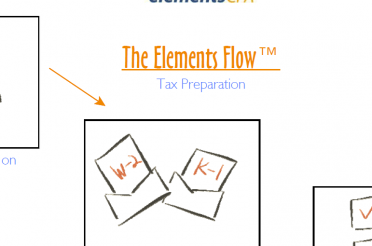Here’s a list to look through for changes to tax law that can benefit you or your small business. Laws are constantly changing, and a few moments to familiarize yourself with these highlights can pay off with saved taxed dollars and smart tax optimization.
Federal tax law changes for 2023 – 2024 tax years
Before diving in, one looming issue to be aware of right now is that the Tax Cuts and Jobs Act (“TCJA“) is set to expire in 2025, and with it, many provisions small businesses have gotten accustomed to the last few years. The biggest is the Qualified Business Income Deduction, which roughly equates to a subtraction from income of 20% of your business’ profit — obviously a huge help. Other provisions include the higher $2,000 Child Tax Credit, the doubled standard deduction for individuals, the removal of personal itemized deduction limitations, and the $10 million estate tax exemption. On the other hand, the cap on deducting state & local taxes will disappear and the deduction for personal exemptions will return. We expect this landmark legislation to be hotly debated this year and next, but we’ll have to see what provisions survive and which evaporate (and their potential for significant impact on your 2025 – 2026 tax return).
With that, highlights of 2023/ 2024 federal tax law changes include:
- The deduction for allowable meals now reverts from 100% to the 50% historically experienced. (Note: Entertainment costs remain non-deductible.)
- The amount of the Research & Development Credit allowable against payroll is increased $500k — This can have a significant impact on small businesses directing employee time or company resources towards to new capabilities.
- The credit for retirement plan startup costs and/or company matching contributions to 100% up to a cap. So if you’ve recently started, or are thinking about starting, a 401k or similar plan, this could be a nice savings for you.
- You can make matching contributions to company plans for employees who are paying down their student loans. A nice perk.
- If you’re a sole proprietor or single-member LLC without employees, you can setup a 401k after the end of the year but before filing your return. An opportunity to stock away a large sum of cash toward retirement.
- The Energy Efficient Home Improvement Credit has been updated and is no longer lifetime capped, the annual cap is now higher too at $1,200, and new things are includible (like home energy audits). This means if you’ve purchased new insulation, windows, doors, heat pumps, skylights, biomass stoves, and others you can claim the credit now and in future years.
- The tax credit for electric vehicles is updated to include more vehicles but has new income caps ($300k MFJ, $225k HOH, and $150k Single) and new purchase price caps ($80k for van/ SUV/ pickup, $55k for all else). There’s also a new credit for used electric vehicles, and for 2024 purchase, you can even get this credit at the time of sale rather than waiting until you file your tax return. (For reference, this is called the Clean Vehicle Credit.)
- The age at which Required Minimum Distributions begin moves to 73 this year (and to 75 starting in 2033).
- You can now roll money from your 529 plan to a Roth IRA. Some caveats include: the 529 accounts needs to be at least 15 years old, you can’t roll anymore than the annual Roth contribution limit per year, there’s a $35k lifetime rollover max, and it needs to be trustee-to-trustee.
- Your company retirement plan can now house an Emergency Savings Account against which you can pull funds for qualifying events. These funds are otherwise treated as Roth-type accounts.
- Early withdrawal penalties from retirement plans are waived for an expanded number of circumstances including firefighters, first responders, domestic abuse victims, terminal illness, and if towards at LTC policy premiums.
State tax law changes for 2023 tax year
Of course, states don’t want to give the feds all the action, so they’ve got some changes for 2023 as well, including:
- For Maryland businesses, there’s a new Security Clearance Costs Credit and First Year Leasing Costs Credit.
- For Maryland business owners, if you pay Pass Through Entity Tax to another state, you’ll need to add that back on your personal return.
- For Maryland individuals, the military retirement exclusion has increased to $12k for those under 55, and $20k for those over 55.
- For Maryland individuals, there’s a tax credit for student loan repayments (trying to make it easier on folks servicing student debt).
- For Maryland individuals, you can now subtract your union dues.
- For DC, things were fairly quiet, but DC did introduce a new form D-30N as a way to help small businesses that aren’t required to file a D-30 but are being prevented from received a DC Clean Hands Certificate without one.
- For Virginia individuals, the military benefit subtraction is now applicable regardless of age (previously only for those 55 or older).
- For Virginia individuals, there’s an increased exclusion of National Guard income plus expanded eligibility.
New federal requirement: Beneficial Ownership Information reporting
Lastly, we’d be remiss if we didn’t take a moment to remind you about a new rule applicable to almost all small businesses: You need to register your beneficial owners in a new federal database administered by the Financial Crimes and Enforcement Network (FinCEN).
Keep your Small Business Tax-Optimized
Tax law is a moving target, but taking stock once a year of what’s out there and what’s changed will ensure that your business and individual taxes stay tweaked to full optimization and savings to your bank account.
A reminder: Be sure to consult with our Tax Designers before trying to apply any of the above rules to yourself — the devil is always in the details when it comes to taxes.
And, of course, also avail yourself of our tax season checklists and tools to make sure you’re ready for this year’s filings. Til then!








